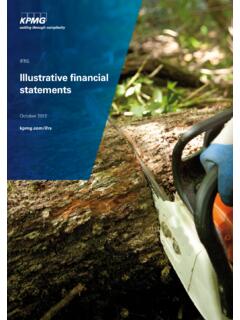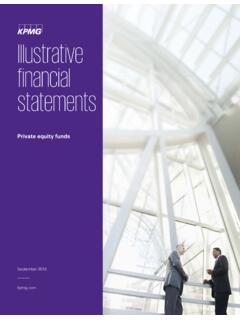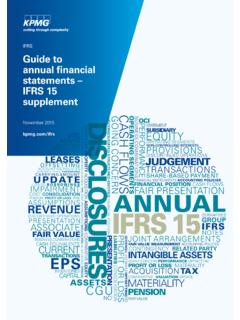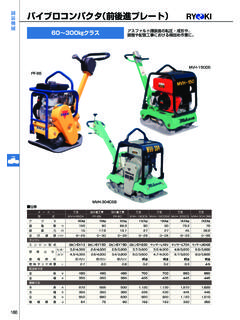Transcription of Impacts on the construction industry of the new revenue ...
1 IFRSI mpacts on the construction industry of the new revenue standardSeptember devil is in the detail 11 Critical judgements at contract inception Pre-contract costs Contract performance obligations How to account for revenue : over time or at a point in time 42 Critical judgements during the contract life cycle Contract costs Contract progress How to measure revenue : variable consideration Contract modifications Loss-making contracts 103 Disclosures 124 Next steps 14 KPMG s Building and construction practice 15 Contact us 15 Impacts on the construction industry of the new revenue standard | 1 2014 KPMG IFRG Limited, a UK company, limited by guarantee.
2 All rights devil is in the detailRecently the IASB and FASB released a new joint standard on revenue recognition IFRS 151 revenue from Contracts with Customers, which is effective from 1 January 2017 and brings together in one standard, the core principles for revenue recognition across all sectors. It also withdraws the current standard that provides specific guidance on contract accounting IAS 11 construction Contracts. The construction industry has effectively lost its contract accounting rule book and will now be guided by the principles of the generic revenue draft versions of IFRS 15 raised concerns in the construction sector that the ability to recognise revenue from construction activities progressively would be curtailed or removed completely.
3 KPMG supported its clients in the construction industry in their pursuit for retaining progressive revenue recognition and this is largely reflected in the new a result, contractors will often find that applying the new standard to a traditional construction contract results in a revenue accounting outcome broadly similar to current stage of completion. Concerns expressed earlier in the development of the standard that revenue may be deferred until practical completion, or that a single contract may be broken down into many small accounting units, have largely been , the devil is in the detail. IFRS 15 introduces many new concepts for revenue and cost recognition.
4 In this publication, we seek to draw out key areas of potential change by considering the life cycle of a typical construction contract. The most notable change for construction contracts is that under IAS 11, recognition of revenue and profits on a percentage of completion basis was required where an arrangement met the definition of a construction contract. Under IFRS 15, progressive revenue recognition will only be permitted where the enforceable contractual rights and obligations satisfy certain criteria. There is no automatic right to recognise revenue on a progressive basis for construction , IAS 11 prescribed how to account for foreseeable contract losses.
5 This guidance is not contained in IFRS 15 and accordingly loss-making projects are now accounted for as onerous contracts under IAS 37 Provisions, Contingent Liabilities and Contingent Assets. This change could have an impact on when losses from loss-making projects are recognised and how they are hope that this publication will help you assess the impact of the new standard on your construction FASB ASC Topic 606 revenue from Contracts with Customers2 | Impacts on the construction industry of the new revenue standard 2014 KPMG IFRG Limited, a UK company, limited by guarantee. All rights reserved. 1 Critical judgements at contract Pre-contract costs What costs can be capitalised during the bid process?
6 IFRS 94, Under IFRS 15, an entity recognises as an asset the incremental costs of obtaining a contract with a IFRS 37 customer only if it expects to recover those costs. However, a practical expedient allows an entity to expense such costs as incurred if the amortisation period of the asset is one year or less. Incremental costs of obtaining a contract are costs that are incurred only as a result of winning a contract ( a sale commission). This focus on purely incremental cost exists in current IFRS; however, it is a new approach in contract accounting. Costs incurred during the bid process that would have been incurred regardless of whether the contract was won or lost ( due diligence costs) are recognised as an expense when incurred, unless they are directly chargeable to the customer, regardless of whether the contract is obtained.
7 For costs other than costs of obtaining the contract, a contractor first considers if such costs can be capitalised under another standard ( as inventory). If not, then a contractor considers if these costs represent fulfilment costs under IFRS 15. Fulfilment costs ( design costs) are recognised as an asset when they: relate directly to the contract or an anticipated contract; generate or enhance resources used in satisfying performance obligations; and are expected to be recovered. IAS 11 IFRS 15 Impact There is currently varied practice as to when bid costs are capitalised. A common approach is to capitalise contract costs incurred after the award of preferred bidder status, to the extent that recoverability under the contract is deemed are not required to be incremental to be capitalised, though they must be attributable to the contract ( due diligence costs and internal tender department costs etc may be capitalised).
8 The definition of incremental costs of obtaining a contract implies that only external costs such as commissions and success fees could generally be recognised as an asset. Internal costs are less likely to meet the incremental costs tests and, for example, an allocation of internal bid team staff costs may be unlikely to meet the criteria to be recognised as an 11 permits a broader range of pre-contract costs to be capitalised, not just those that are incremental, when it is probable that the contract will be 15 allows incremental costs of obtaining a contract and fulfilment costs to be capitalised when they are expected to be recovered. Costs not meeting these criteria are expensed as incurred.
9 There does not appear to be a meaningful difference between the terms probable and expected to be recovered .Costs incurred during the contract bid phase may comprise both contract bid costs as well as fulfilment costs , for example, if the bidder is required to complete detailed design work as part of its bid costs must be incremental costs to be costs must meet the criteria discussed above to be capitalised. Fulfilment costs related to an anticipated contract ( not yet awarded) may also be capitalised if these costs are expected to be on the construction industry of the new revenue standard | 3 2014 KPMG IFRG Limited, a UK company, limited by guarantee.
10 All rights Contract performance obligations Can construction accounting be done at the contract level?IFRS 30, IFRS 15 requires an entity to identify the performance obligations in a contract. A performance IFRS 12 obligation is a promise in a contract to transfer a good or service to a customer it is the unit of account for contract accounting. A performance obligation may be identified explicitly in the contract or implied through previous business practices, published policies or specific statements. A good or service is distinct from other goods and services, and so is a performance obligation if: the customer can benefit from the good or service either on its own or together with other resources that are readily available to the customer; and the promise to transfer the good or service to the customer is separately identifiable from other promises in the contract.















